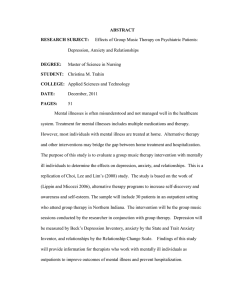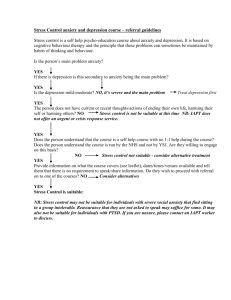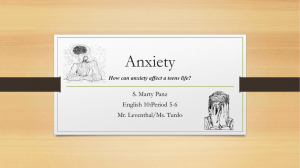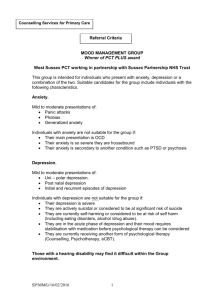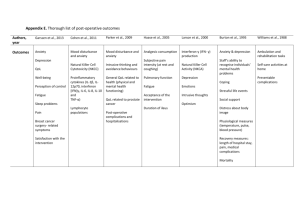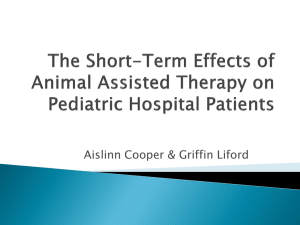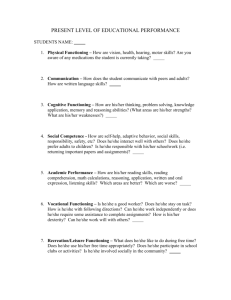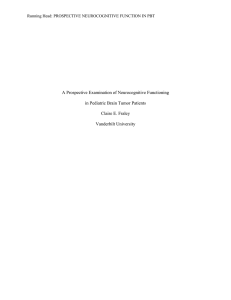Document 11129517
advertisement
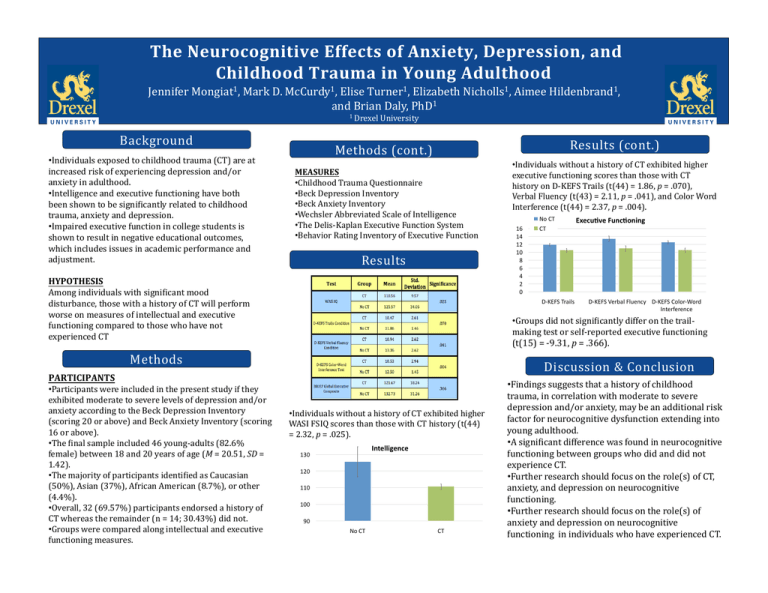
T he N eurocognitive E ffects o f A nxiety, D epression, a nd Childhood T rauma i n Y oung A dulthood Jennifer Mongiat1, Mark D. McCurdy1, Elise Turner1, Elizabeth Nicholls1, Aimee Hildenbrand1, and Brian Daly, PhD1 1 Drexel University Background • Individuals exposed to childhood trauma (CT) are at increased risk of experiencing depression and/or anxiety in adulthood. • Intelligence and executive functioning have both been shown to be signiKicantly related to childhood trauma, anxiety and depression. • Impaired executive function in college students is shown to result in negative educational outcomes, which includes issues in academic performance and adjustment. Results (cont.) Methods (cont.) MEASURES • Childhood Trauma Questionnaire • Beck Depression Inventory • Beck Anxiety Inventory • Wechsler Abbreviated Scale of Intelligence • The Delis-­‐Kaplan Executive Function System • Behavior Rating Inventory of Executive Function Results HYPOTHESIS Among individuals with signiKicant mood disturbance, those with a history of CT will perform worse on measures of intellectual and executive functioning compared to those who have not experienced CT No CT 16 14 12 10 8 6 4 2 0 CT Execu-ve Func-oning D-­‐KEFS Trails D-­‐KEFS Verbal Fluency D-­‐KEFS Color-­‐Word Interference • Groups did not signiKicantly differ on the trail-­‐ making test or self-­‐reported executive functioning (t(15) = -­‐9.31, p = .366). Methods Discussion & Conclusion PARTICIPANTS • Participants were included in the present study if they exhibited moderate to severe levels of depression and/or anxiety according to the Beck Depression Inventory (scoring 20 or above) and Beck Anxiety Inventory (scoring 16 or above). • The Kinal sample included 46 young-­‐adults (82.6% female) between 18 and 20 years of age (M = 20.51, SD = 1.42). • The majority of participants identiKied as Caucasian (50%), Asian (37%), African American (8.7%), or other (4.4%). • Overall, 32 (69.57%) participants endorsed a history of CT whereas the remainder (n = 14; 30.43%) did not. • Groups were compared along intellectual and executive functioning measures. • Individuals without a history of CT exhibited higher executive functioning scores than those with CT history on D-­‐KEFS Trails (t(44) = 1.86, p = .070), Verbal Fluency (t(43) = 2.11, p = .041), and Color Word Interference (t(44) = 2.37, p = .004). • Individuals without a history of CT exhibited higher WASI FSIQ scores than those with CT history (t(44) = 2.32, p = .025). Intelligence 130 120 110 100 90 No CT CT • Findings suggests that a history of childhood trauma, in correlation with moderate to severe depression and/or anxiety, may be an additional risk factor for neurocognitive dysfunction extending into young adulthood. • A signiKicant difference was found in neurocognitive functioning between groups who did and did not experience CT. • Further research should focus on the role(s) of CT, anxiety, and depression on neurocognitive functioning. • Further research should focus on the role(s) of anxiety and depression on neurocognitive functioning in individuals who have experienced CT.
